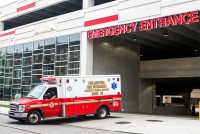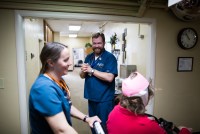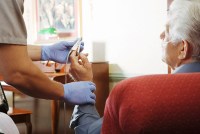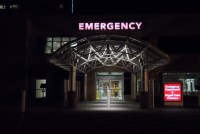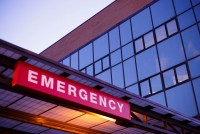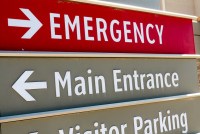Latest KFF Health News Stories
Hospitals Slashed Use Of Two Heart Drugs After Huge Price Hikes
Hospital use of two popular heart medicines, nitroprusside and isoproterenol, dramatically dropped after the prices for both soared.
EMS Delays In Rural Areas Leave First-Aid Gap For Bystanders To Fill
Response times for emergency medical service units are about twice as long in rural areas as in urban areas, researchers say, underscoring the need for trained lay people to provide first aid until professional help arrives.
Influx Of Elderly Patients Forces ER To Practice Comfort Care
Despite a culture clash and lack of time and training, ER doctors see how palliative care averts suffering for elderly patients with serious illnesses.
Urgent Care Sites Cater To Cancer Patients, Letting Them Check Some Worries At Door
Hospitals and oncology practices are setting up urgent care services aimed specifically at cancer patients to help keep them out of the hospital.
What Doesn’t Kill You Can Maim: Unexpected Injuries From Opioids
Doctors are beginning to pay attention to injuries, such as brain damage or kidney failure, that can afflict people who survive an overdose.
In Remote Idaho, A Tiny Facility Lights The Way For Stressed Rural Hospitals
In a region where bears outnumber people, a small medical facility sets a modern example for rural hospitals on life support.
For Some Hospice Patients, A 911 Call Saves A Trip To The ER
Hospice groups are teaming up with specially trained paramedics to deal with common problems that worried patients or families incorrectly think need hospital care.
ER Visits Linked To Falls Spike Among California Seniors
State data show a rise of nearly 40 percent in fall-related visits from 2010 to 2015, a period in which the elderly population grew about 21 percent.
How Long You Stay On Opioids May Depend On The Doctor You See In the ER
A study shows some emergency physicians wrote far more opioid prescriptions and Medicare patients who saw those doctors were more likely to still be taking the addictive painkillers months later.
After-Hours ER Care May Come With A Doctor’s Surcharge
Patients sometimes find an additional charge, generally between $30 and $200, tacked onto their bill for visiting a hospital emergency room between 10 p.m. and 8 a.m.
Helping Ex-Inmates Stay Out Of The ER Brings Multiple Benefits
Each year, millions of Americans leave jail and prison. When they do, they’re likely to have a hard time managing their health. Some clinics are trying to provide ex-inmates with better, cheaper care.
Clinics Help Keep People With Serious Mental Illness Out Of ER
Providing regular care at a Texas clinic prevents patients from cycling back to the hospital in a psychiatric crisis.
Study Finds Nearby Retail Clinics Don’t Drive Down ER Visits
The results suggest that retail clinics may not provide a solution for reducing unnecessary emergency department visits, researchers say.
Community Paramedics Work To Link Patients With Mental Health Care
Training these first responders to identify people who are suffering from mental illness and connect them with treatment other than the emergency room could be part of the solution to gaps in the nation’s mental health system.
Study: ‘Ubiquitous’ Nature Of Painkillers Lands Kids — Even Toddlers — In The ER
New research tracks how the widespread availability of these high-powered medications is causing a high rate of hospitalizations for opioid poisoning among children.
Niños pequeños terminan en emergencias médicas por consumo de opioides y analgésicos
Un nuevo estudio destaca a un grupo de pacientes soprendente, que sufre de intoxicación por opioides en tasas que también han marcado un aumento dramático: adolescentes, niños e incluso niños pequeños.
Will A Study Save Victims Of Violence Or Gamble With Their Lives?
A major study in Philadelphia will look at whether it is better for people with gunshot or stab wounds to get basic care from paramedics or more advanced care before going to the hospital, as most do now.
Emergency Room Use Stayed High In Oregon Medicaid Study
A new study on Oregon’s famed Medicaid experiment eight years ago shows no decline in emergency room care even after two years of coverage.
Scarcity Of Mental Health Care Means Patients — Especially Kids — Land In ER
Research released by the American College of Emergency Physicians highlights how gaps in mental health care play out in the emergency room with longer stays and difficulties in securing follow-up care.
Better Training, Tourniquets And Techniques Since 9/11 Are Saving Lives
U.S. trauma care experts are increasingly focusing on ways to help civilian victims of violence — whether the incidents were mass shootings or bad car accidents — avoid bleeding to death at the scene.




